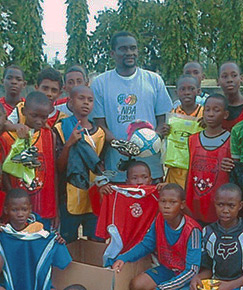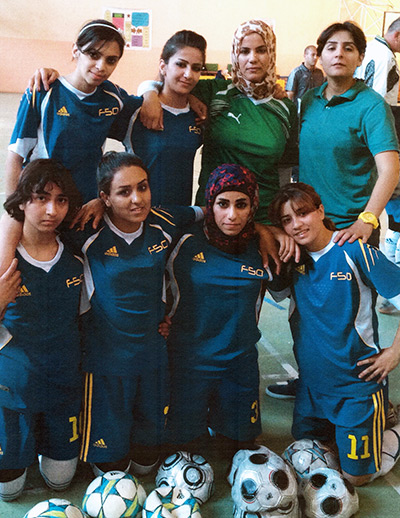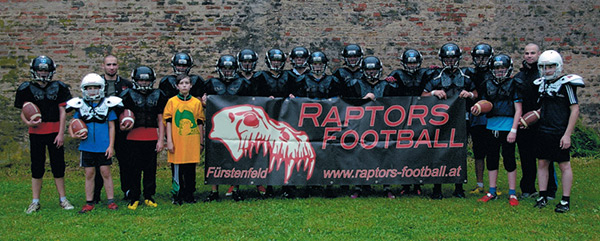Mason's Sports Equipment Donations Reach Around the World
October 29, 2015

Children in Tanzania unpack a box of donated soccer balls and shirts provided through the Center for Sport Management at Mason.
In one of the photos, all of the teenagers are holding up green and white shirts with the word "Mason" stitched across the front.
"That was taken in Samoa, in the Pacific Islands," said Craig Esherick.
Another photo shows young men and women wearing DC United soccer shirts. "That's Tanzania."
The photos are like postcards from the world, providing a glimpse of how far the generosity of the George Mason University community stretches.
"Soccer equipment is popular everywhere. We've donated large quantities of soccer balls or apparel to groups from South Sudan, India, Libya, Tunisia, Iraq, Yemen, Brazil, Sri Lanka, Egypt, Cote d'Ivoire, Mauritania, Haiti, Tanzania, Burundi, and Uganda," said Esherick, an associate professor and academic program coordinator for the Sport Management program in Mason's School of Recreation, Health, and Tourism.
Not just soccer items have made their way around the globe. Baseball bats, balls, and apparel have gone to groups in Mexico, Venezuela, Columbia, Cuba, and South Africa; track and field uniforms to an aboriginal group in Australia; basketballs and practice uniforms to Tanzania, Burkina Faso, Benin, and Cameroon; and footballs to Austria.

Members of a female soccer league in Iraq pose in front of donated soccer balls from the United States.
In fact, Mason's Center for Sports Management (CSM) has filled an office from floor to ceiling with donated equipment provided by organizations such as Arlington Little League Baseball, a Fairfax County sports organization, DC United, and several Mason sports teams.
CSM acts as an informal clearinghouse. "It's a natural extension of what we're doing in sport diplomacy with groups that visit us from all over the world," said Esherick. "Local sports organizations are happy to donate equipment they no longer need so others have an opportunity to use it."
Sport diplomacy happens each month when international groups arrive on the Mason campus as part of the Sports United visitors program. Now in its fifth year, the program is a fast-paced, two-week exchange program sponsored through the U.S. Department of State. Participants are non-elite athletes, coaches, or sports administrators selected by U.S. embassies around the world.
To date, 60 groups from every continent except Antarctica have come to campus to learn about the United States people and culture, with Mason faculty, students, and administrators as their guides.
Personal connections are made, emails and snail-mail addresses are exchanged, and requested equipment gets shipped. Recently, for example, a 50 lb. box from Mason arrived at the U.S. Embassy in Samoa. The clothing and equipment was presented to SENESE, an organization that provides sporting and other activities for children with vision and hearing disabilities.

A nonprofit youth football club in Vienna, Austria shows off the 40 footballs they received from Mason.
Last year, CSM was especially glad to send soccer balls to a female soccer federation in Iraq, where the opportunity for girls and young women to participate in sports has been restricted in the past.
"Many of the participants and their sports federations appreciate this help for their programs back home," said Esherick.
In a tangible way, the donations mean that connections created by the sport diplomacy effort have a lasting effect. "Through this program, our students, faculty, and staff get to meet people from all over the world and get to know them on a personal level," said Esherick.
"If we can also help get needed equipment to their communities, it's just another way for us to support the power of sports, and the reach of Mason, to change lives and connect people," he said.
This article was written by Pam McKeta.
About CEHD
George Mason University's College of Education and Human Development (CEHD) includes two schools: the Graduate School of Education, one of the most comprehensive education schools in Virginia, and the School of Recreation, Health, and Tourism. CEHD offers a full range of courses, certificates, and degree programs on campus, online, and on site to more than 4,000 students each year. CEHD is fully accredited by NCATE, and all licensure programs are approved by the Virginia Department of Education. George Mason University, located just outside of Washington, DC, is Virginia's largest public research university.
For additional information:
- CEHD Communications: cehdnews@gmu.edu
- School of Recreation, Health, and Tourism: https://rht.gmu.edu/
- Sport Management program: https://rht.gmu.edu/sport-management/
Follow CEHD on Facebook at www.facebook.com/MasonCEHD or Twitter at @MasonCEHD.
